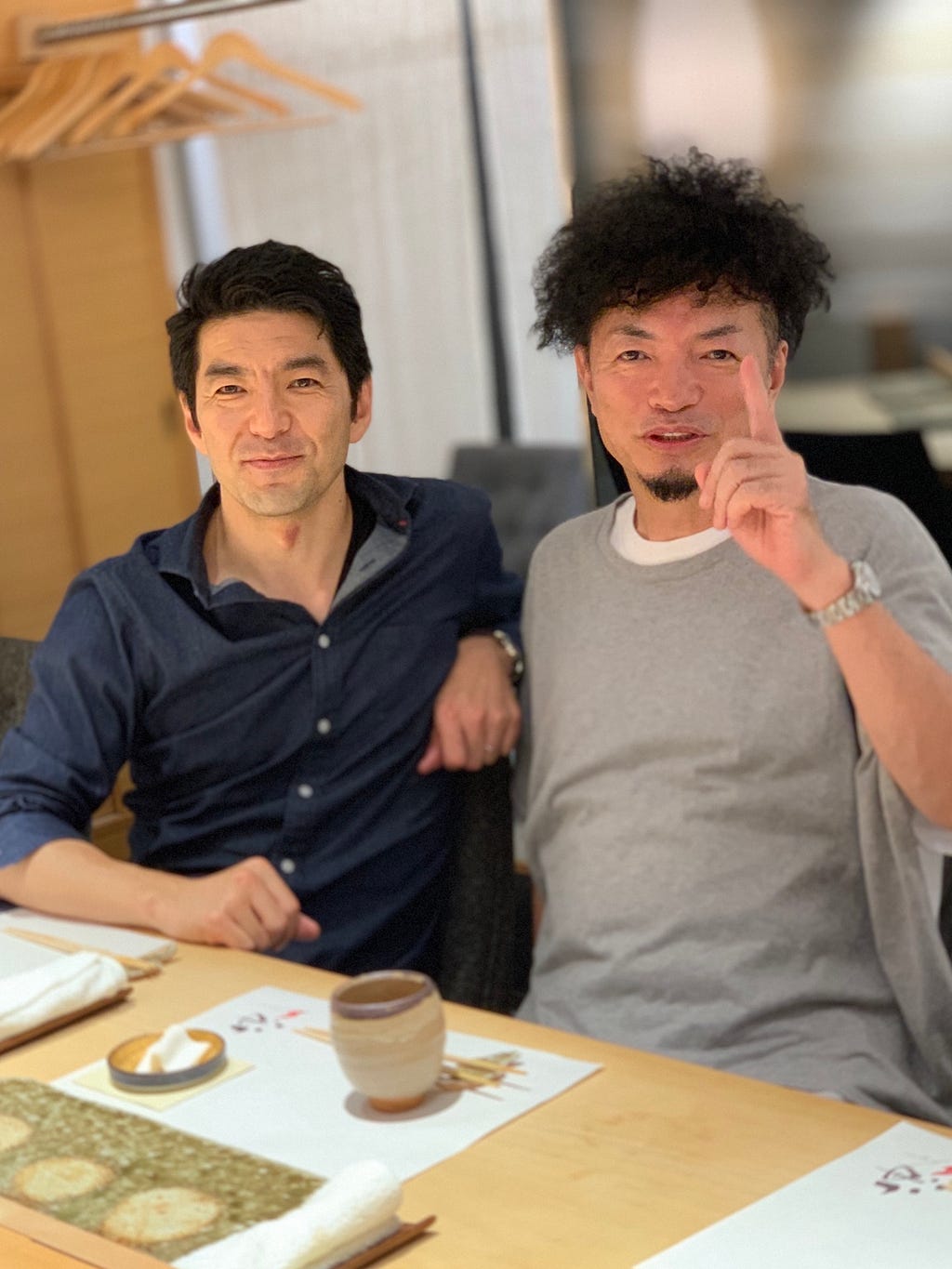There is no such thing as a perfect boss but these seven traits might help identify the good ones

The first boss
The first boss I ever had in the creative industry was Noriyuki Tanaka, a legendary artist/designer in Japan in the 1990s. I managed to get an apprenticeship position at his studio as I was about to graduate from college through an acquaintance who made an introduction to him for me.
Not even 40 yet, Noriyuki-san was a prolific star designer/artist who was producing an eclectic body of creative work. He did client work to earn money and would use that money to create his own artwork and organize art shows. His approach to creativity was pure, ambitious, yet practical all at the same time.
To this day, the experience I got under him remains the most intense one I ever had in my 20+ career.
After I left his studio, his stardom became even more stellar. He created the first TV spot for Nike in Japan in the 1990s. Later, he became the first creative director for Uniqlo and helped make it a major apparel player in Japan well before it became the internationally recognized brand that it is today.
He was the best and possibly the trickiest first boss to work for.
I say this with the utmost respect and a lot of love. I told him as much when I saw him a few years ago over sushi in Tokyo.
He was the best because his pursuit of creativity was relentless. Until I worked for him, I didn’t know how one would earn a living by being creative. He may not be well known outside of Japan, but his work was world-class and some of the most creative and artistic work I’ve ever seen. Without his tutelage, I wouldn’t be here. Period.
When I now tell people in the industry in Japan that I worked under Noriyuki-san, they all get impressed, even 25 years after the fact. He’s one of the very few people I know directly for whom the word “genius” is used. He was and still is a man of legends.
And that’s often followed by “Did he ever show up on time?” He was notorious for not being punctual. Another one of many legendary tales of Noriyuki-san.
He had very little if any, grasp of time. He was so bad about managing the time that it was completely unpredictable what time he would show up. Being late three hours to a meeting was the norm. Japan, as some readers might know, is a painfully punctual society where a minister was forced to apologize because he was three minutes late to a meeting, or a train company delivered a formal apology because one of its trains left a station just 20 seconds too early.
Even with his lack of punctuality, he still kept his clients. Noriyuki-san was that good.
His studio was just him and his art director/designer. I joined as a very inadequate third leg of the stool. There was no job description for the position because, well, it wouldn’t have mattered anyway.
My job included anything and everything. My day started with cleaning the bathroom, sweeping the floors, taking the trash and heaps of cigarettes out (the studio had no cleaning service), answering emails and phone calls, scheduling meetings (a tricky endeavor, see above), delivering disks to the vendor (the Internet wasn’t fast enough to handle heavy files), bringing printed work back to the studio before we showed them to clients, etc. In between these, I asked for bits and pieces of design work that I could get from my superior art director and tried to touch as much of the studio’s work as possible.
In the 1970s and 80s, the Japanese word “karoshi (overwork death)” became known outside of Japan. The corporate culture in the 1990s when I started working there hadn’t drastically improved.
This, coupled with Noriyuki-san’s lack of time management, made my working hours just insane. The day would start around 11am and it would continue until about 6am the next morning (yes, 19-hour day). I would go home to take a shower, doze off for a couple of hours, and then be back at the studio around 11am the next day. This happened 4 or 5 days out of the 6 days a week that I worked. It was a brutal introduction to the creative industry.
It sounds horrible, I know. Still, I now appreciate the exposure to the level of creativity from my first boss at the very beginning of my career.

“I had to clean up my act,” said Noriyuki-san with a shrug over drinks after that sushi dinner. He told me he got his lifestyle in order, now manages his time better, quit smoking, and started eating much more healthily. Granted, this was around 1am, so maybe not the healthiest but it’s all relative. Regardless, he looks remarkably young for someone who is over 60.
Seven traits
Since Noriyuki-san, I’ve had several bosses, as one would, over the course of my 25-year career. If I were honest, not every boss was great, but that’s ok, there is no such thing as a perfect boss. I learned something from everyone.
Here are the traits that I observed and valued from various bosses. Combined, they might give us an idea of what we should look for in a boss.
1. Motivate
Although not the easiest job, what I appreciated about working under Noriyuki-san was, in addition to his relentless appetite for never-been-done ideas, his way of motivating us that I grew to appreciate, even years after I had left his studio.
In the early days of my apprenticeship, I remember him telling me, upon showing my work, “You have something better in you. Why don’t you iterate and find it?”
Much like a good coach who can make us a better player, a good boss pushes, not forces, us to a new height that we didn’t reach on our own. They can motivate and elevate us beyond our abilities.
2. Have a superpower
Every boss that I respected, even if they might have been flawed, had some kind of superpower.
One knew how to tell a story. Really well.
Another had such magnetic and infectious energy around clients that made them enamored and naturally want to work with us.
One designer boss I knew had such a strong command of keyboard shortcuts of design software that watching him design was like watching someone playing the piano.
David Ogilvy, one of the advertising tycoons of the 20th century, recalled his days working in the kitchen of the Hotel Majestic in Paris and said that whenever the executive chef picked up the knife to cook, everyone in the kitchen was in awe of the master at work.
A good boss has some superpower that we aspire to.
3. Take action
“What do you think we should do differently at this company?” One Japanese CEO that I work with asked me out of the blue a few years ago. I told him that they needed more females in the position of power. A year later, the CEO named a female leader as a regional CEO. It might not sound like a big step but in a male-dominated corporate culture of Japan, this was a rarity and I was impressed by the fact he took action.
4. Have our back
Back in 2002, an employee suggested to Tadashi Yanai, the global CEO of UNIQLO and its parent company Fast Retailing, that they start a grocery business selling fruits and vegetables. The logic was that UNIQLO had such a strong understanding of supply chain management that they could apply the know-how to the distribution of fresh produce and eliminate waste.
All the board members were against it, but Yanai was not. “Try it.”
Less than two years later, UNIQLO lost more than 30 billion yen (≈$20 million) and decided to halt the venture. Feeling accountable for the failure, the employee gave a resignation letter to Yanai.
“What are you talking about? Use the experience for the next time and earn back the money we lost,” said Yanai to the employee with a laugh.
This employee was Osamu Yunoki who later started GU, a younger sibling brand to UNIQLO, and made it the second biggest brand within Fast Retailing. Yunoki is the CEO of GU.
When a boss has our back, it could be more empowering than one would ever imagine.
5. Listen to our needs
Tom Bedecarre, the former CEO of AKQA, was the person who hired me back in 2004. At the time, AKQA was virtually unknown within the industry. I thought I would give it a try for a few years and see what would happen. I ended up staying there for more than a decade.
Throughout that time, Tom would always ask me what I wanted to do and accomplish. At times I had some clear goals and desires, other times, not so. What Tom did was always listen and gave me different opportunities. This meant that I was able to have multiple roles and grew in ways I didn’t imagine I could.
6. Care about us
In my early twenties, I had an accident while playing soccer after work and lost my eyesight in one of my eyes. It was a retinal detachment and a few other complications that required multiple surgeries.
Bog Greenberg, the founder and CEO of R/GA, heard about my injury a few days after the incident. He made a point of coming to my desk to bring a yellow sticky note with a phone number on it.
“I just talked to one of the best eye doctors in the country about your injury. He’s in New York. Call this number now,” said Bob.
I dialed and talked to Dr. Stanley Chang and got to see him right away. In addition, Bob gave me a check for $6,000 or 7,000 to cover the deductible that I had to pay to the insurance company for my surgery.
I’m forever grateful for the level of care Bob gave to me.
7. Admit mistakes
“I am sorry” are the three most difficult words for bosses to say, especially male ones. But when a boss is man enough to admit their mistake(s) and actually apologizes, that can be a powerful means of connection.
Many years ago, an old boss of mine apologized to me after a rather unpleasant exchange we had. He was sincere, which made such a positive impression on me that my level of respect increased quite a bit after that. That incident made me trust him more.
Writing these now, I realize that I’ve been fortunate enough to have some amazing bosses. That now makes me want to try harder to be a better boss to the people around me. I hope I can make a fraction of the difference for them that my former bosses made for me.
There are many more bosses I’ve had over the years that I didn’t have room here to mention. Every one of them made an impact on me and I’m one way or another a product of their influence. I hope to see them in person one day again and tell them how much their mentorship meant to me.
Thanks for reading. If you like what you read, please subscribe and get my newsletter, every week directly in your inbox.
Originally published at https://reiinamoto.substack.com.
Seven traits of a good boss was originally published in UX Collective on Medium, where people are continuing the conversation by highlighting and responding to this story.
Looking for cool gifts? Check Rott515 store!
